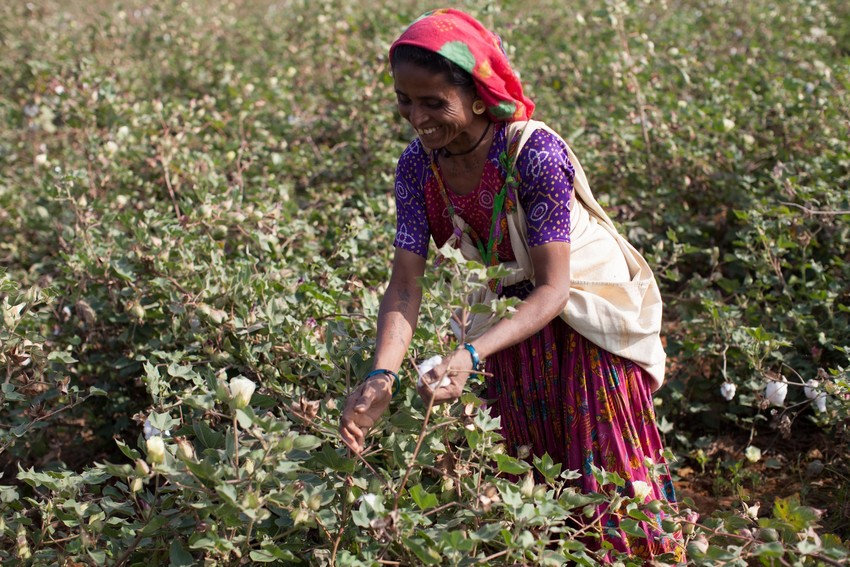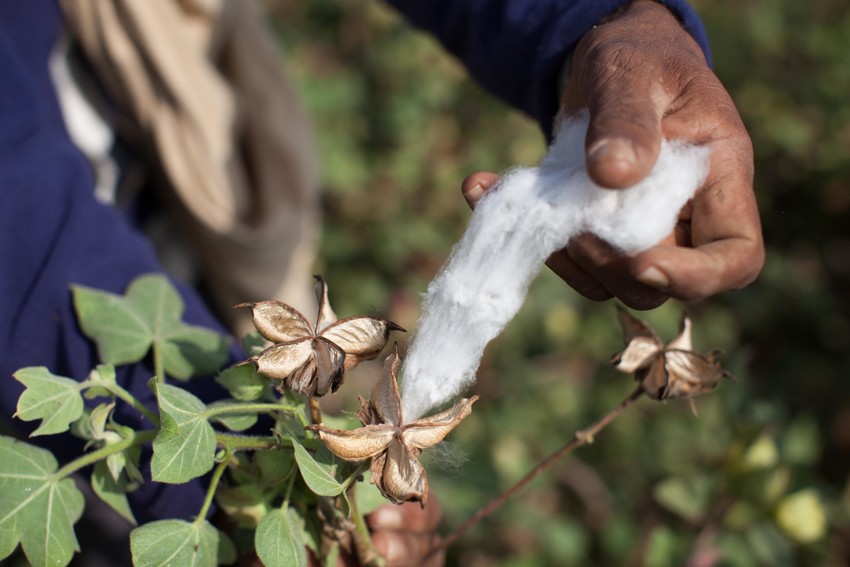by Subindu Garkhel, Senior Cotton and Textiles Lead, Fairtrade UK.
Cotton farmers are integral to the creation of many of our favourite clothes, but their importance to the global fashion industry isn’t reflected in the price they receive for their work. Millions of small-scale farmers across the world are struggling to make a decent living from cotton, with Covid-19 and climate change making their situation even harder.

In 2020, the pandemic forced much of the global fashion industry to grind to a halt, leaving cotton farmers vulnerable to falling market prices, without an economic or social safety net.
There is a simple way that you and your family and friends can support cotton farmers through this difficult time. Buy a piece of Fairtrade cotton clothing and cotton farmers will receive at least the Fairtrade Minimum Price and the Fairtrade Premium for their hard work.
More of us choosing products made with Fairtrade cotton means more children in school, more farmers investing sustainably in their businesses and communities, and more savings for emergencies.
When you support Fairtrade cotton farmers in the shops, we’re able to implement emergency projects to support farmers through times of crisis. Here’s how we’re supporting Indian cotton farmers to continue to earn a sustainable income through the pandemic.
FASHION COMPANIES CANCELLED CONTRACTS
In 2020, when countries around the world enforced lockdowns to control the spread of Covid-19, many retailers and businesses had to close. In cotton producing countries, supply chains were disrupted through factory closures and restrictions on exports.
Whilst some brands and retailers managed to shift their production to essential items (like masks), many clothing orders were cancelled. $2 billion worth of orders were cancelled from Bangladesh alone and only a fraction of the usual new orders were coming in.
Due to uncertainty in the market and predictions that cotton prices in 2020 would be lower by approximately 12% compared to previous years, some farmers considered converting their cotton production to growing food for their families in order to avoid food insecurity.

FAIRTRADE QUICKLY PROVIDED FARMERS WITH SEEDS AND TRAINING
In the second half of 2020, Fairtrade implemented an emergency relief project with GIZ (Deutsche Gesellschaft für Internationale Zusammenarbeit GmbH) to support sustainable cotton cultivation during the pandemic. We worked with our colleagues in cotton growing regions to mitigate the short, medium and longer-term impacts of the pandemic. The project provided cotton seeds, food crop seeds, agricultural inputs and technical training to over 1,500 farmers in Madhya Pradesh, Gujarat and Tamil Nadu.
1,650 packets of non-GMO cotton seeds and organic inputs (neem oil and nimbecidine) were given to farmers across the three regions. Farmers also received packets of vegetable and crop seeds (millet, moong pulse, sesame) and training on cultivating vegetable gardens to diversify their production and provide additional food security for their families. The project gave farmers income and food security.
‘It is a very great help from Fairtrade [to receive] vegetable seeds for our day to day home consumption of vegetables, so that we can avoid visits to the market in this COVID crisis.’ Said Mr. Vanjibhai, a cotton farmer from Dhrangadhra.
BIOGAS UNITS FOR CLEANER, HEALTHIER ENERGY
The next phase of the project aims to build 15 biogas units in five communities in Madhya Pradesh. Each unit will provide fuel to 100 farmers and their families.
Biogas is the gas produced through the anaerobic digestion of waste materials, largely comprising methane and carbon dioxide (60:40). Methane provides a source of smokeless fuel, which can help prevent respiratory infections that may occur when other fuel sources, such as firewood, are used.
We are looking at more ways to help farmers build resilience to better respond and adapt to other threats they face, such as climate change.
None of this work would happen without people like you choosing Fairtrade. With the trans-Tasman bubble now open, we hope to see a healthy revival of the fashion sector and ultimately more security and a fair price for cotton farmers.
Find out where to buy Fairtrade cotton clothes.
First image of Shantiben Charda, a Fairtrade-certified cotton farmer picking cotton in Rapar district, Gujarat, India. Photo by Sean Hawkey, taken in 2017.
Second image of a cotton farmer picking a handful of cotton in Rapar district, Gujarat, India. Photo by Sean Hawkey, taken in 2017.

